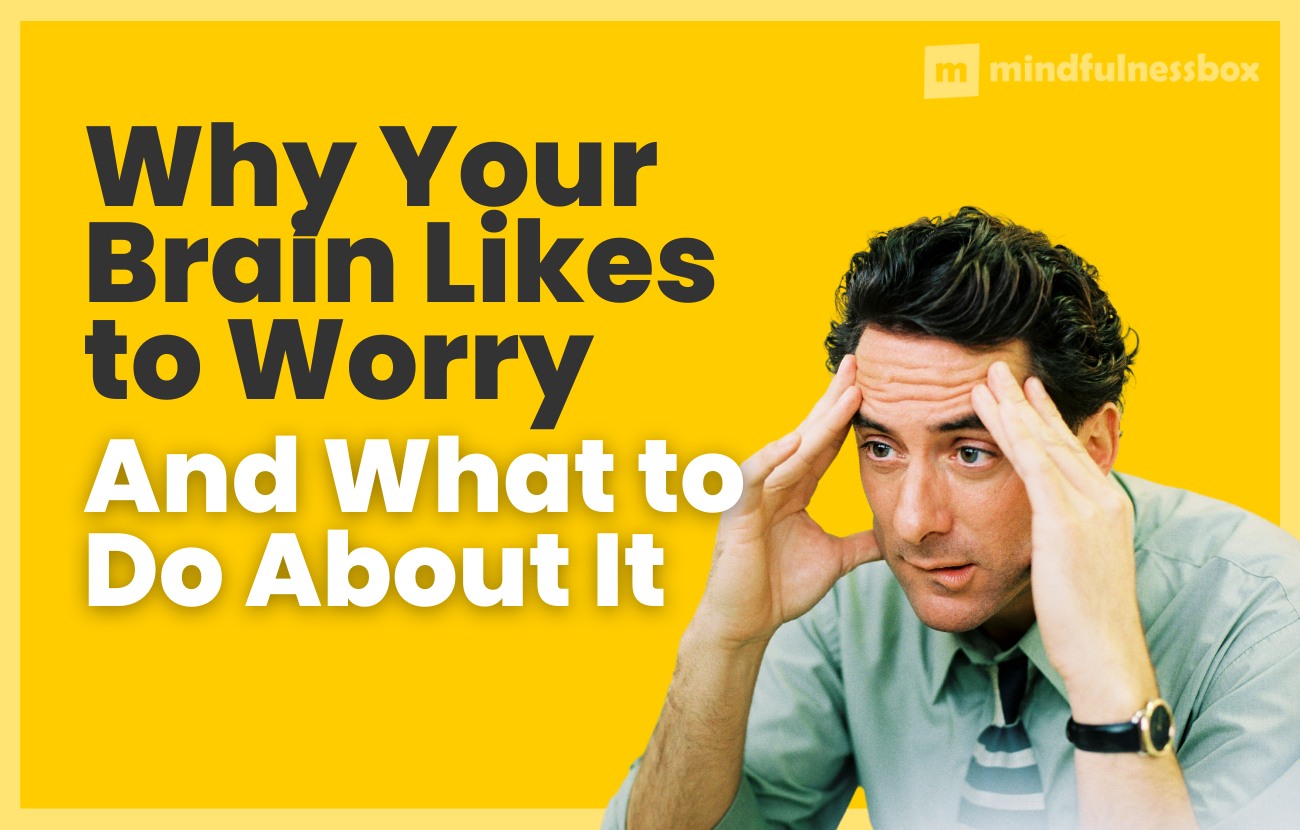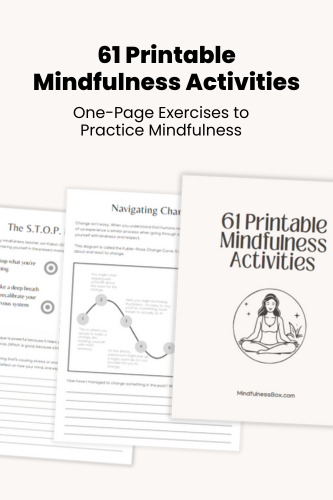The brain’s capacity for worrying is incredible. And believe it or not, your brain is actually trying to help you by worrying! Evolutionarily speaking, worrying about potentially negative outcomes is useful. In this article, I’ll walk you through why your brain worries, and what you can do about it.
But first, a short story…
A few years back, I went on a solo trip to Bali with the intention of relaxing and learning to scuba dive.
Get dozens of one-page exercises to help practice mindfulness, meditation, gratitude, and self love. Perfect for printable handouts when teaching mindfulness to groups, students, or in the workplace.
To see examples, plus a full list of the 61 exercises included, click below.
Work had been busy and I was looking forward to an adventure.
It was beautiful, but soon enough the anxiety wheels started to spin.
The scuba instructor didn’t show up the first day. Or the second day. With no other responsibilities to focus on, my brain fixated on this and turned it into a mini-crisis. Frustrated, I canceled my scuba plans and went on to explore other parts of the island.
I joined a tour on bicycle through villages and rice paddies, but as I saw other people traveling with their friends, I felt lonely and wondered what I was doing there alone.
“Was it all a big mistake?,” I wondered in between half-read Kindle books on the beach.
By the end of the trip, I was telling people “yeah, Bali was great” while knowing that in reality, it was no vacation.
My brain was in full-time worry mode.
In BALI. On vacation.
What the heck was going on?
In recent years that I’ve realized something:
My brain simply wants something to worry about.
If I solve the thing my brain is currently worried about, it’ll move on to something else.
As frustrating as it is, we’ve got to give the mind some credit:
When it worries, it’s actually trying to help us.
Your brain is trying to keep you safe

Not long ago I read a book called How Not to Die.
It’s a book about diet, nutrition, and living longer.
One of my takeaways is that we shouldn’t guilt or shame ourselves for gorging on ice cream or eating a bunch of donuts. It’s not healthy, but it’s absolutely natural that we’re doing this.
Why?
Because our brains run on an ancient operating system.
We prefer high-calorie treats because in the ancient foraging days, we would’ve come across treats like honey so rarely that gorging had only positive effects on our survival.
We face a similar dilemma with anxiety.
Our brains are trying to help us.
Our foraging ancestors would’ve been rewarded for constantly looking out for threats.
Calm and Zen-like attributes weren’t as likely to be passed on.
(Those chilled-out ancestors were more likely to be eaten by lions.)
Takeaway?
When you feel anxiety, know that this is your brain and nervous system using the rules of 15,000 years ago to try and help you survive.
So, what do I do with this information?
So, to recap:
- Our minds are in anxiety-seeking mode because they’re trying to protect us. (Those “what if” ruminations might have saved us from becoming lion food 15,000 years ago).
- If we solve one problem, our minds move on to the next.
These are sobering facts. It’s frustrating to be shackled with minds that turn pleasant afternoons into worry-fests.
But knowing these facts helps us in two ways:
First, we’re not doing anything “wrong” by worrying.
Anxiety isn’t pleasant, but it isn’t bad.
It isn’t a sign of poor self-discipline. It’s natural.
Our minds and nervous systems are trying to protect us.
So at the very least, let go of any negative feedback loops. If you’re worrying about worrying, or frustrated about your anxiety itself: let that go.
Second, solving specific sources of anxiety is not a solution.
This is a hard one.
When you’re in the midst of worry, it can feel like solving that Big Scary Item at the top of your worry list is the path to erasing anxiety forever.
This is not the case.
Remember that your mind will move on.
You will find something else to worry about.
What else can you do about anxiety?
You probably think I’ll say “just meditate” here, and the truth is-
Yes.
Meditation is one path towards reducing anxiety.
It helps you detach yourself from your thoughts, which makes it less likely to get stuck in a worry loop.
You’re more likely to see your thoughts for what they are:
Just thoughts. Not reality.
Next, try affirmations.
Affirmations for anxiety are based on the psychology principle of “thought replacement.” If you’re able to identify negative thoughts and replace them with positive thoughts (through regular repetition), you may be able to shift your identity and perception of yourself.
For example, if you’re telling yourself a story that you’re just an anxious person, you might counter that with a regular affirmation like:
“When I feel tension, that is my cue to remind myself to let go.”
Finally, you may also be able to shift your relationship with anxiety and worry by reframing it.
Remember that anxiety is your brain trying to help you.
And remember that solving the “issue of the day” isn’t a sustainable path toward tackling anxiety.
Further Inspiration
For further reading on worry and anxiety, check out:

My mindfulness practice kicked off in 2016 with a ten-day silent retreat. Since then, I’ve read dozens of books about mindfulness and completed hundreds of hours of meditation. Thinking about what makes humans happy, calm, and peaceful is endlessly fascinating to me.


